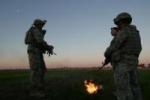AMANPOUR: And do you believe that should -- not next week or next
month -- but should Afghanistan fall to the Taliban again, that it would
again become a base for al Qaeda to have its operations there?
GATES: I think -- I think the thing to remember about Afghanistan is
that that -- that country, and particularly the Afghan-Pakistan border,
is -- is the modern epicenter of jihad. It is where the Mujahedeen
defeated the other superpower. And their view is, in my opinion, that
they now have the opportunity to defeat a second superpower, which, more
than anything, would empower their message and the opportunity to
recruit, to fundraise and to plan operations.
So I think you have to see this area in a historical context in terms
of what happened in the 1980s and the meaning of the victory over the
Soviet Union in order to understand the importance of this symbiotic
relationship between al Qaeda and the Taliban and -- and the other
extremists, frankly.
AMANPOUR: So you think they would come back if Afghanistan fell?
GATES: I don't know whether the -- whether al Qaeda would sort of move
their headquarters from the Fatah to -- back into Afghanistan, but
there's no question in my mind that if the Taliban took large -- took
control of significant portions of Afghanistan, that that would be added
space for al Qaeda to strengthen itself and -- and more recruitment and
more fundraising.
But what's more important than that, in my view, is the message that it
sends that empowers al Qaeda. Al Qaeda, in many respects, is an
ideology. And the notion that they have come back from this defeat --
come back from 2002, to challenge not only the United States, but NATO
-- 42 nations and so on -- is a hugely empowering message, should they
be successful.









 "A Sherman can give you a very nice... edge."- Oddball,
"A Sherman can give you a very nice... edge."- Oddball, 
Bookmarks